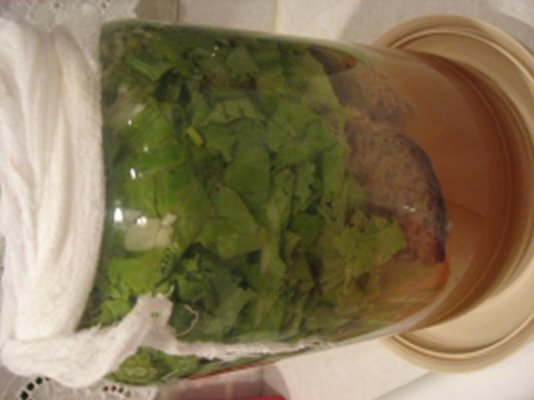This one was the most helpful, I'm gonna imply these tips on my next batch.
Pickle pointers affect safety and quality
By Libby Colbert,
Colorado State University
Extension, Arapahoe County
You may have noticed that Grandma's pickle recipe calls for alum or lime and wondered if you should use it. Not only is this recipe out of date, it also may make your pickles unsafe to eat. Besides using an old-fashioned recipe, it's surprising how many factors can affect the quality and safety of homemade pickles, such as:
- The weather and growing conditions of the cucumbers.
- The time lapse and holding temperature between gathering and pickling.
- The acidity of the vinegar used.
- The method of pickling process.
- The temperature of storage.
Typical pickle problems include slippery or soft pickles, shriveling of pickles, pickles that are hollow, dark or dull, sediment in the pickle jar and spoilage.
Slippery or soft pickles may be caused by:
- Using cucumbers with blossoms attached (scrub or cut off).
- Using a brine too weak for curing (maintain salt concentration specified in recipe).
- Using vinegar with too low an acidity (use 5 percent acidity).
- Not covering cucumber with brine (keep immersed in brine).
- Not removing scum daily on fermented pickles.
- Using moldy garlic or spices (always use fresh spices).
Shriveling of pickles may be caused by:
- Using too strong a vinegar solution.
- Using too strong brine at beginning of curing.
- Using too heavy syrup (pickling solution too sweet).
- Allowing too much time between gathering and brining.
- Overcooking or over processing.
- Dry weather (not preventable).
Hollow pickles may be caused by:
- Faulty growth (during washing, hollow cucumbers usually float. Use these for relishes).
- Improper curing (be sure and use correct strength brine).
- Cucumbers standing too long before brining (start within 24 hours after gathering).
- High temperature during fermentation process.
Dark pickles may be caused by:
Using ground spices such as cloves (use whole spices instead).
Minerals in the water-especially iron (use soft water).
Material of cooking utensils (do not use copper, brass, galvanized or iron-use enamelware, glass, stainless steel or stoneware).
Cooked too long with the spices (remove before canning).
Low nitrogen content of cucumbers.
Iodized salt (use canning or pickling salt).
Dull or faded color may be caused by:
- Poor quality of cucumbers.
- Sunburned cucumbers.
- Cucumbers not well cured.
- Over-mature cucumbers.
- Cucumbers grown under unfavorable conditions.
White sediment at bottom of jar may be caused by:
- Use of table salt (use pickling or canning salt).
- Bacteria that grows during fermentation.
Spoilage may also be caused by:
- Not washing the vegetables well before pickling.
- Not using sterilized jars.
- Using ingredients that have lost strength (use only fresh, blemish-free fruits and vegetables).
- Not using standard jars and new lids.
- Not measuring ingredients accurately (be sure and use only up-to-date, research-based recipes).
Even if all these are avoided, a final disappointment could occur if the jars don't seal! This failure could be caused by:
- Filling jars with large, cold cucumbers and pouring boiling solution over several jars before capping (the solution cools down and air is not exhausted from the jar).
- Using a recipe that does not require heat, such as some fermented pickle recipes.
- Using non-standard jars.
- Using the old open-kettle method of processing. Be sure to process in the Boiling Water Bath Method! Pickle products require heat treatment to destroy organisms that cause spoilage and to inactivate enzymes that may affect flavor, color and texture.
- Be alert for signs of spoilage. Examine a jar before opening and note any bulging or leakage, which may indicate spoilage. Other signs include spurting liquid, disagreeable odor, mushiness or slipperiness of the product. If in doubt, throw it out! Dispose of the contents so that they cannot be eaten by humans or animals.
Other tips
- Fermented cucumbers and fresh dill pickles are processed differently from the usual procedures. Start processing time when jars are placed in the boiling water. This prevents development of a cooked flavor and loss of crispness.
- Don't pack pickles too tightly in the jar, this could prevent enough pickling solution from being added to the jar. Be sure that all the solution in a recipe is used for the specified amount of pickles.
- Old-fashioned recipes may call for alum or lime. These are "firming agents" to help keep pickles crisp. Now that quality ingredients are available, including vinegar of five percent acidity, lime or alum are not necessary for crisp pickles. These agents are no longer included in recipes recommended by the U.S. Department of Agriculture. Soaking cucumbers in ice water for 4 -5 hours prior to pickling is a safer method for making crisp pickles. If lime is used, the excess lime absorbed by the cucumbers must be removed to make safe pickles. Pickles must be rinsed and re-soaked in fresh water for an hour, then repeated two more times. Failure to remove lime adequately may increase the risk of botulism.
- Process pickled products in a boiling water bath for the altitude-adjusted length of time stated in the recipe. Store processed pickles in a dark, cool, dry place.



